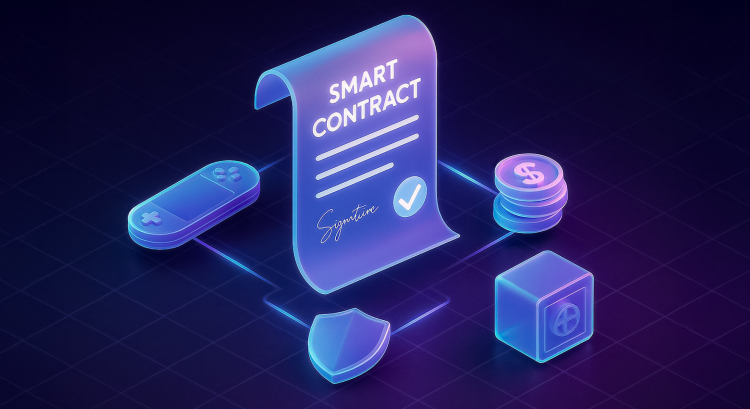Over the last decade, the worldwide litigation finance sector has grown dramatically, transforming into a multibillion-dollar industry that combines capital and justice. Traditionally, litigation funding entails investors providing financial assistance to plaintiffs or law firms in exchange for a percentage of the eventual recovery. This concept allows claimants with limited means to pursue meritorious lawsuits, while investors gain access to a non-correlated asset class.

However, the sector remains highly reliant on complex manual processes, opaque agreements, and trust-based relationships. Smart contracts are blockchain-based digital agreements that execute automatically when certain criteria are satisfied. In theory, smart contracts might transform litigation finance by automating fund transfers, assuring transparency, and reducing conflicts over performance and payouts.
Understanding Smart Contracts in Litigation Finance
A smart contract is a self-executing program maintained on a blockchain network that does certain actions, such as transferring assets or modifying records, when certain circumstances are met. Smart contracts, unlike ordinary contracts, are made up of lines of code that automatically enforce responsibilities.
When used in litigation finance, smart contracts could manage a variety of operations that are currently performed manually, including:
- Funding allocation is the automatic release of capital to a law firm or plaintiff once case milestones (such as court filings or counsel acceptance) have been validated.
- Performance tracking entails recording crucial litigation events on blockchain for real-time transparency.
- Profit distribution: Upon settlement or verdict, proceeds are automatically allocated to claimants, investors, and lawyers in accordance with agreed-upon procedures.
- Auditability entails keeping an immutable, verifiable record of all transactions relating to a case or funding agreement.
These attributes have piqued the interest of both fintech entrepreneurs and legal-tech innovators looking to improve an industry infamous for its secrecy and inefficiency.
Benefits of Using Smart Contracts in Litigation Finance
The adoption of smart contracts offers several potential advantages for funders and litigants alike:

- Transparency & Trust : Every transaction, from fund disbursement to settlement payout, can be validated using a blockchain ledger. This transparency instills confidence in investors, donors, and claimants.
- Cost and time efficiency : Smart contracts reduce human error and legal costs by automating ordinary administrative processes. This may greatly reduce the cost of managing litigation funding portfolios.
- Global Investment Access : Tokenized litigation financing has the potential to democratize participation by allowing smaller investors around the world to get access to an asset class that was previously reserved for large hedge funds or private equity firms.
- Conditional Performance : Smart contracts can combine data oracles and trusted data feeds to validate real-world events such as court rulings or settlement payments, ensuring that funds are only delivered when legitimate milestones are met.
Challenges and Risks
Despite the promise, there are still major challenges preventing full-scale adoption.
1. Legal Enforceability
While smart contracts are technically binding by code, their legal enforceability is contingent on jurisdictional recognition. Most courts continue to rely on traditional contract standards, which require explicit record of the parties’ permission, intent, and understanding. If a smart contract malfunctioned or was exploited, legal remedy would still be limited to off-chain agreements, which are textual contracts that mimic or reference digital code.
This results in a hybrid structure, with a smart contract for automation and a traditional legal contract for enforcement. The lack of defined legal frameworks for blockchain-based agreements remains one of the most significant barriers to widespread implementation.
2. Oracle Reliability
Smart contracts use external data sources known as oracles to validate real-world occurrences. In lawsuit finance, these could be court rulings, settlement notices, or escrow confirmations. If an oracle provides faulty or altered data, the smart contract may execute wrongly, releasing or withholding payments in error.
Building trustworthy, tamper-proof oracles for legal data is a significant technical challenge that must be overcome before large-scale implementation can take place.
3. Complex Legal Variables
Litigation rarely takes a binary approach. Cases can be settled, appealed, or dismissed at various stages, usually on secret terms. Encoding all of these variables into a smart contract is tricky. Legal issues entail decisions, negotiations, and changing situations, all of which are difficult to automate.
Thus, while smart contracts can manage structured processes (such as payments and milestone tracking), they suffer with interpretive procedures that rely on human judgment.
4. Privacy and Confidentiality
Legal proceedings frequently involve protected or sensitive information. Even if the data is encrypted or anonymized, storing it on a public blockchain could put parties at risk of privacy breaches. Private or permissioned blockchains can reduce this danger, but they may compromise transparency and decentralization.
Compliance with data protection rules such as the EU’s GDPR or California’s CCPA is extremely difficult, especially since blockchain data cannot be readily updated or destroyed.
5. Regulatory Uncertainty
Tokenizing legal claims or returns may categorize them as securities, inviting regulatory attention under legislation such as the United States Securities Act or the European Union’s MiCA framework. Navigating these restrictions increases the difficulty for inventors.
Emerging Use Cases for Smart Contracts in Litigation Finance
Several ventures are testing blockchain-based litigation finance alternatives. Platforms like LexShares, Yieldstreet, and AxiaFunder are looking at digital infrastructure to make lawsuit finance more transparent and scalable.
Meanwhile, blockchain-native projects are creating tokenized legal assets that let investors to buy fractional stakes in claim portfolios. These smart-contract systems can disburse proceeds automatically when they have been validated as resolved.
However, many programs are still in the pilot stage, with little real-world deployment due to unresolved legal and regulatory issues.
The Future: Are Smart Contracts in Litigation Finance the Real Deal?
Smart contracts in litigation finance now fall in between innovation and speculation. The underlying technology is reliable, and the efficiency improvements are evident. However, the legal institutions that control conflict settlement are inherently conservative and sluggish to change.
In the near future, we might expect to see hybrid models of traditional legal agreements supplemented by smart contracts for fund administration and audits. As regulators and courts adopt blockchain technology, fully autonomous lawsuit funding systems may become a reality.
Conclusion
Smart contracts have the ability to transform the way litigation finance operates by introducing automation, transparency, and global participation. However, for the time being, they are more of an emergent reality than a common practice.
The main difficulty is not technology, but legal recognition, regulatory clarity, and effective data integration. As those components come together, smart contracts have the potential to convert litigation finance from a niche financial tool to a globally accessible, technology-driven asset class.
